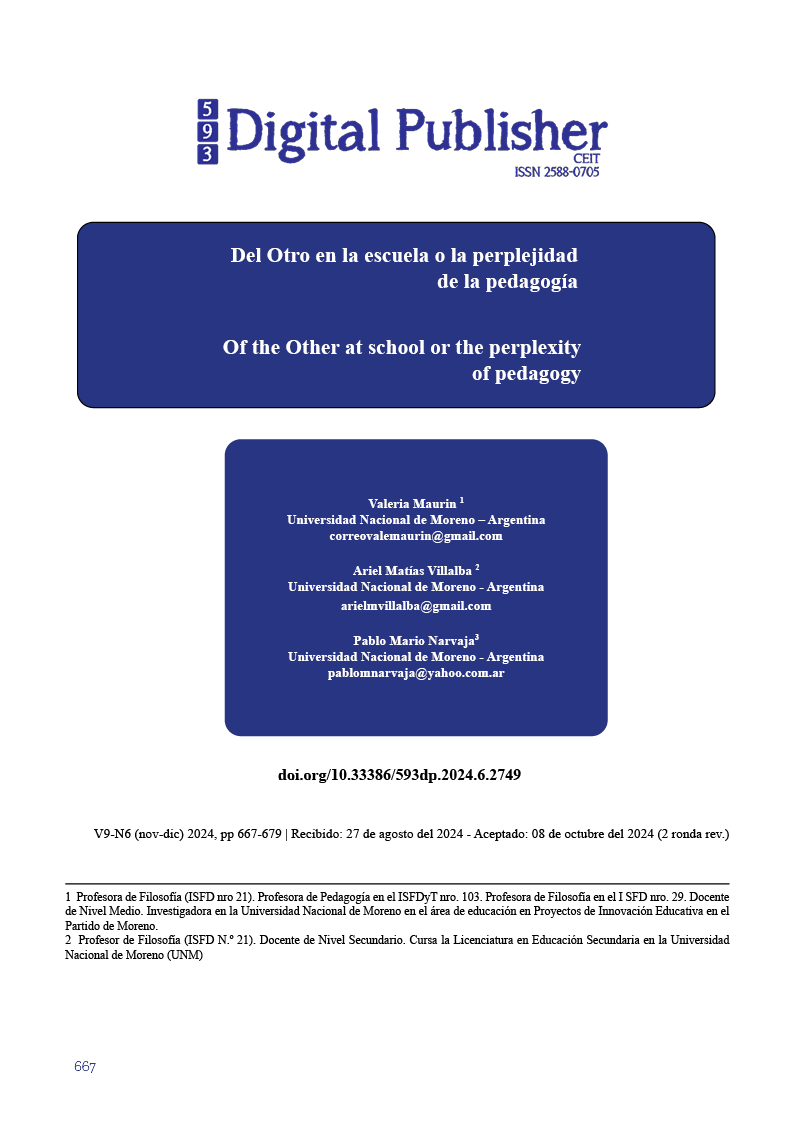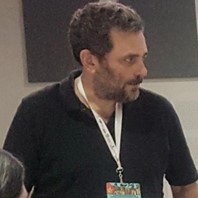Of the Other at school or the perplexity of pedagogy
Main Article Content
Abstract
This paper explores the philosophical perspectives on the figure of the Other within school praxis, aiming to contribute analytical elements to educational inclusion policies. It examines how schools address the issue of diversity, recognizing that the school system, as a political product, often reflects a universalist project that elevates the values of the dominant society to a universal category. The paper delves into the historical context, highlighting Aristotle’s views on rationality and the hierarchical relationship between the master and the slave, and how these ideas influenced the perception of cultural superiority.
The authors discuss the resistance to the imposition of dominant cultural values within the educational context, identifying the tension between orthopedagogic practices aimed at normalizing diversity and the true inclusion of the Other. They argue that these practices often lead to the classification and control of students rather than fostering genuine educational growth. Orthopedic strategies seek to correct and normalize student differences, molding them according to the values of the dominant culture, which results in the suppression of the plurality and diversity that they intend to embrace.
Drawing on Derrida’s concept of hospitality, the paper questions the possibility of true hospitality within the school system, suggesting that the current approach may suppress the pluralism and diversity it aims to promote. The discussion also touches on the transition from pagan to Christian logos and its implications for cultural and rational distinctions in the context of colonialism and modern educational systems.
The authors call for a reevaluation of the dominant discourse and pedagogical practices to create a more inclusive and hospitable educational environment that respects and integrates the diverse cultural backgrounds of all students.
Downloads
Article Details

This work is licensed under a Creative Commons Attribution-NonCommercial-ShareAlike 4.0 International License.
1. Derechos de autor
Las obras que se publican en 593 Digital Publisher CEIT están sujetas a los siguientes términos:
1.1. 593 Digital Publisher CEIT, conserva los derechos patrimoniales (copyright) de las obras publicadas, favorece y permite la reutilización de las mismas bajo la licencia Licencia Creative Commons 4.0 de Reconocimiento-NoComercial-CompartirIgual 4.0, por lo cual se pueden copiar, usar, difundir, transmitir y exponer públicamente, siempre que:
1.1.a. Se cite la autoría y fuente original de su publicación (revista, editorial, URL).
1.1.b. No se usen para fines comerciales u onerosos.
1.1.c. Se mencione la existencia y especificaciones de esta licencia de uso.
References
Agamben , Giorgio (2011). Qu’est-ce qu’un dispositif? En: Sociologica, año 26, número 73, pp. 249-264 mayo-agosto de 2011.
Bachelard, Gastón (2000). La formación del espíritu científico. México. Siglo XXI editores.
Balcarce, G. (2016). Derrida (1ra ed., Vol. Coleccion La revuelta filosofica). (L. Soares, Ed.) Buenos aires: Galerna.
Colombani, M. C. (2008). Espacio y Poder. La escuela como espacio de resistencia ante la nueva coyuntura socio-politica. Universidad Nacional de Mar del Plata, (pág.1- 11). Mar del Plata. https://es.scribd.com/document/184142809/Espacio-y-Poder-en-La-Escuela
. Foucault y lo politico. Buenos Aires: Prometeo.
(2007) Mismidad y Otredad. Una lectura desde una dimensión genérica en Berbeglia C.E(coord.) Propuestas para una antropología argentina. TomoVII comprensión y tolerancia. Buenos Aires, Biblos ed.(pp.23-37)
Devés Valdés, Eduardo (2000). El pensamiento latinoamericano en el siglo XX. Entre la modernización y la identidad. Tomo 1, Del Ariel de Rodó a la CEPAL (1900-1950)-Buenos Aires, Biblos - Centro de Investigaciones Diego Barros Arana,
Dreher Heuser E.(2014). En el rastro de la filosofía de la diferencia (Gómez Piltcher M. y Gómez Ma Soledad Trad.) en Skliar Carlos; Frigerio Graciela (comp.) Huellas de Derrida: ensayos pedagógicos no solicitados. Paraná. Fundación La hendija (pp 33-50)
Foucault, Michel (1991). Saber y verdad. Madrid, La Piqueta.
Goffman, Erving (2006). Estigma. La identidad deteriorada. Buenos Aires, Amorrortu.
Jaspers, Karl (2000). La filosofía: desde el punto de vista de la existencia. México, Fondo de Cultura Económica.
Narvaja, P., & Baumgratz, A. (2018). El problema de la pedagogía normativa. 593 Digital Publisher CEIT | ISSN 2588-0705, 3(3), 4-19. Recuperado a partir de https://www.593dp.com/index.php/593_Digital_Publisher/article/view/52.
Esbozo de una pedagogía escolar (2017). En: 593 Digital Publisher CEIT: Año 1 / Nº. 4 / Quito (Ecuador) / Noviembre - Diciembre 2017 / ISSN 2588-0705.
Nisbet, Robert (1991). Historia de la idea de progreso. Barcelona, Gedisa.
Saraiva K.(2014). La Babel electrónica. Hospitalidad y traducción en el ciberespacio en Skliar Carlos; Frigerio Graciela (comp.). Huellas de Derrida: ensayos pedagogicos no solicitados. Paraná. Fundación La hendija (pp.51-63)
Ortega y Gasset, J. (2019). Ideas y creencias y otros ensayos. Madrid: Alianza .
Reber, Arthur. (1989). Implicit learning of tacit knowledge. Journal of Experimental Psychology: General. 118. 219-235. 10.1037/0096-3445.118.3.219.)
Skliar Carlos(2014)Pensar al otro sin condiciones) desde la herencia, la hospitalidad y la educacion. En Skliar Carlos ; Frigerio Graciela: Huellas de Derrida: ensayos pedagogicos no solicitados. Parana. Fundacion La hendija(pp 11-31)
Sztajnsrajber, D. (2023). El amor es imposible. Ciudad Autónoma de Buenos Aires: Paidós.
Tedesco, Juan Carlos (2011).En: Sarmiento, Domingo Faustino. Educación popular; con presentación de Juan Carlos Tedesco e Ivana Zacarías. - 1a ed. - La Plata: UNIPE: Editorial Universitaria.
Vatimo, G. (2009). Despues de la Cristiandad: por un crisitanismo no religioso. (C. Revilla, Trad.) Buenos Aires: Paidos.
Zea, L. (1978). Filosofia de la Historia Latinoamericana. Ciudad de Mexico: Fondo de la Cultura Economica.




